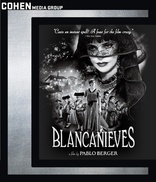Blancanieves Blu-ray Movie
HomeBlancanieves Blu-ray Movie 
Snow WhiteCohen Media Group | 2012 | 104 min | Rated PG-13 | Sep 03, 2013
Movie rating
7.3 | / 10 |
Blu-ray rating
| Users | 0.0 | |
| Reviewer | 4.5 | |
| Overall | 4.5 |
Overview
Blancanieves (2012)
A twist on the Snow White fairy tale that is set in 1920s Seville and centered on a female bullfighter.
Starring: Maribel Verdú, Macarena García, Daniel Giménez Cacho, Emilio Gavira, Sofía OriaDirector: Pablo Berger
| Drama | 100% |
Specifications
Video
Video codec: MPEG-4 AVC
Video resolution: 1080p
Aspect ratio: 1.34:1
Original aspect ratio: 1.37:1
Audio
Spanish: DTS-HD Master Audio 5.1
Spanish: Dolby Digital 5.1
Subtitles
English
Discs
50GB Blu-ray Disc
Two-disc set (1 BD, 1 DVD)
Playback
Region A (locked)
Review
Rating summary
| Movie | 4.5 | |
| Video | 4.5 | |
| Audio | 4.5 | |
| Extras | 2.5 | |
| Overall | 4.5 |
Blancanieves Blu-ray Movie Review
The fairest of them all.
Reviewed by Jeffrey Kauffman August 27, 2013Have you ever had a really cool idea, one that you’re sure no one has thought of, and you set off to make it a reality, only to have your dreams dashed when you discover someone else beat you to the punch somehow? Years ago when a band I led had gotten some rather nice international press and a major magazine accolade, I tried unsuccessfully to arrange a so-called co-publishing deal with a major jazz star for a song of his for which I had written a lyric, and which I had already recorded with an absolutely fantastic and well known female singer. I wasn’t able to make successful contact with the composer, unfortunately, and I was thunderstruck a couple of years later when the very same song appeared with a different lyric written by someone else. And so in a very real way I feel Pablo Berger’s pain. Berger had struggled for years with his concept of creating a black and white silent film, and finally was close to realizing it when a little movie called The Artist came along and pulled the creative rug out from underneath Berger. While there are obviously some conceptual similarities between The Artist and Berger’s Blancanieves, in most ways they couldn’t be more different. The Artist is a paean to Hollywood, albeit a Hollywood in the midst of a sea change. Berger’s film is much more redolent of European cinema, especially the French love affair with folktales and myth as exemplified by such classics as Jean Cocteau’s Beauty and the Beast. Hollywood has dressed up several fairy tales over the past few years in such problematic efforts as Jack the Giant Slayer, Hansel & Gretel: Witch Hunters and Snow White and the Huntsman, the last of which springs from the same source as Blancanieves, the timeless tale of a beautiful princess denied her birthright by a scheming stepmother. If the live action film with Kristen Stewart and Charlize Theron attempted to invigorate the hoary story with a number of fanciful reimaginings of the original’s iconic elements, Blancanieves is perhaps even more daring in some of its plot contrivances, while at the same time staying much truer to the chilling but magical ambience of the original fairy tale.
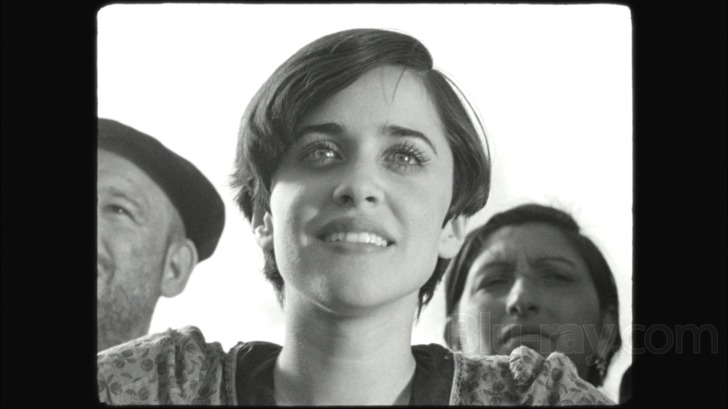
While Berger has gone on record stating how much classic French cinema has influenced him (and Blancanieves), fans of some of Guillermo del Toro’s more magical realist pieces like Pan's Labyrinth or The Devil's Backbone. As with those films, we’re presented with (initially at least) a child’s eye view of a very emotionally overwrought situation. The film admirably sets up the predicament of little Carmencita (Sofía Oria) by introducing us to her parents before she’s born. Her father is legendary bullfighter Antonio Villalta (Daniel Giménez Cacho) and her mother Carmen (Inma Cuesta) sits ringside at his latest bout despite the fact that she appears to be precariously close to delivering a baby. Antonio is taking part in a somewhat mad sounding display where he takes out a series of bulls, and he’s about to finish off the last hapless beast when the unthinkable happens, and he’s badly gored. At almost the same moment, Carmen goes into labor.
At the hospital, twin tragedies bookend a minor miracle. Antonio’s injuries leave him a quadriplegic and Carmen dies giving birth, but at least the baby girl has been born healthy. That only makes Antonio disconsolate and he foists the baby off on the grandmother, Doña Concha (Angela Molina). Meanwhile, the nurse attending Antonio, Encarna (Maribel Verdú), has become instantly intrigued by the fact that her patient is incredibly rich and, now, a widower. It doesn’t take her long to extend her hooks into him rather forcefully, and the two are soon married. Meanwhile, Carmencita has arrived at her first communion day wanting nothing other than to finally meet her father.
A day of potential joy is tinged with sadness when little Carmencita sees a car pulling away which she assumes has her father in it and later when a real tragedy strikes and she is forced to move into what would seem to be a dream come true—her father’s palatial mansion. However, she’s met there by Encarna, who soon introduces Carmencita to the horrors of being a stepchild, in a sequence the brings to mind Cinderella as much as it does Snow White. Carmencita is forced to live in a filthy barn and is also required to do most of the physical labor around the huge property, and most importantly, she is absolutely forbidden to go to the second floor of the main house, which is where her father is kept.
One day Carmencita’s beloved pet rooster gets loose and of course manages to get upstairs, and through a series of misadventures, Carmencita is finally reunited with her father. The two have fleeting moments together when Encarna is otherwise occupied (including sexually with the chauffeur). Things take a desperate turn when Encarna becomes aware that the two are seeing each other (she’s already proven herself to be a vicious “caretaker” of Antonio), and after a particularly disturbing episode, Carmencita realizes she will probably never see her father again, though she at least has the memories of his lessons in bullfighting which he passed on to her. An artful segue finally introduces us to the now grown Carmen (Macarena García), who is alerted to the horrible fact that Encarna has “arranged” for the death of Antonio.
Encarna has the nasty chauffeur drive Carmen out into the forest, ostensibly to pick flowers for Antonio’s grave, but the dastardly man first tries to amorously assault Carmen and then, when she rebuffs his advances, he strangles her and drowns her, leaving her for dead. She’s resuscitated by a group of traveling dwarves who also happen to put on comedic bullfighting shows around the countryside, and though her ordeal has left her completely without memory, she soon finds she has bullfighting skills of her own, and a perfect marriage of sorts is born. As with most marriages, however, there’s just a bit of tension with one of the dwarves, who is convinced that Carmen is going to spell trouble for the entire troupe.
As should hopefully be more than clear from the above summary (which does not delve into the third act for spoiler reasons), Blancanieves is an extremely whimsical reboot of the Snow White legend, but the film obviously has much more on its mind than mere fairy tales. As the beautifully illustrated insert booklet states (in quotes one assumes are from Berger himself), “Blancanieves is a sensory experience. The viewer must feel rather than think, and be led by a story told only through images and music. Film as ceremony and cathartic experience.” A quote absolutely attributed to Berger states, “Imagine if watching a film was a different experience, a fusion of images and music, a hypnotic, sensual experience. Imagine being a child again, feeling the magic and terror of a Gothic tale.”
And so Pablo Berger has given us a film which intentionally seeks to subvert the rational mind, the articulate mind, in order to bathe us in the pure symbiotic relationship of image and sound. This is Berger’s love letter to early cinema, a time which, like fairy tales themselves, may seem childlike to the sophisticated palettes of modern day adults, but which often contain unexpected complexities and profundities hidden within apparent simplicity. While Blancanieves exploits a number of techniques which are far more advanced than most silent films, there’s a touching innocence to this project that makes it one of the most completely captivating films in recent memory. I don’t mind admitting that while I admired The Artist, it left me rather cold on an emotional level. Without giving too much away about Blancanieves’ beautifully rendered final moments, I doubt Carmen will be the only one with a tear in her eye as the film comes to a close.
Blancanieves Blu-ray Movie, Video Quality 
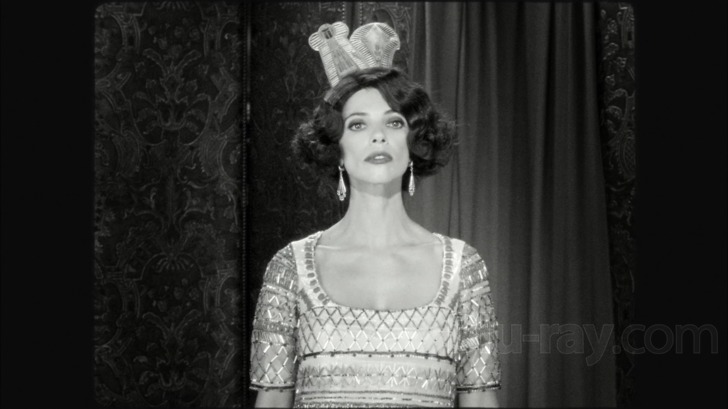
Blancanieves is presented on Blu-ray courtesy of Cohen Media Group with an AVC encoded 1080p transfer in 1.34:1. Those who hear that a film's format is 16mm and immediately assume that that has to mean fuzzy, grainy imagery may well be shocked by Blancanieves' clear, nicely defined image (the actual source format is Super 16). The film was put through a DI stage where things may in fact have been tweaked aside from the blow up to 35mm, for there is not an overwhelming amount of grain here, which does not mean that inversely there is any appreciable lack of detail, as a cursory glance at some of the screenshots will prove. Look for instance at the first screenshot, where the small blonde down on Macarena García's cheek and chin are clearly visible—sorry, Ms. García, it's all in the cause of "science". That said, this image is not razor sharp, as should be expected, but that only lends itself to the slightly dreamlike quality of this story. Contrast is incredibly strong, offering rich, lustrous blacks and bold whites, with beautifully modulated gray scale. The elements do have a couple of extremely minor blemishes, but you're going to have to be eagle eyed to catch them.
Blancanieves Blu-ray Movie, Audio Quality 
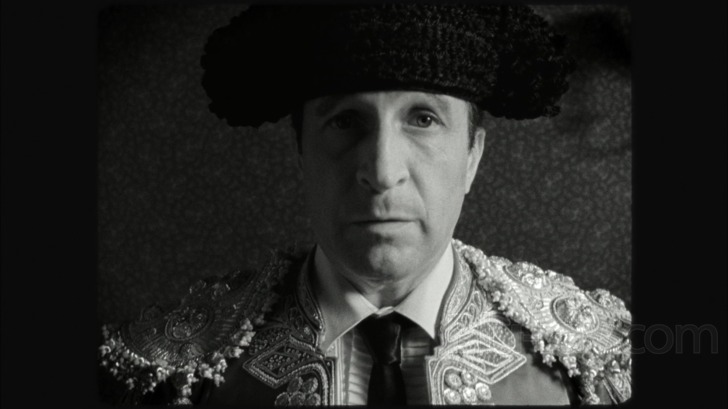
Blancanieves' lossless DTS-HD Master Audio 5.1 mix consists entirely of Alfonso de Vilallonga's evocative score (the language listing in the specs above is slightly misleading, but this is in essence a "Spanish" film, though even the original Spanish language intertitles here have been replaced with English ones for this release, and other Spanish language text in the film has been subtitled). That might seem to suggest that surround activity isn't going to be overwhelming, and on one level, that's probably true, for this often gentle, whimsical score has very few "in your face" (or perhaps more appropriately "in your eardrums") moments, and instead traffics in gentler fare, However, there are some standout effects, including the use of castanets that move through the surround channels rather mysteriously at times. Fidelity is top notch, delivering both the symphonic and ethnic instruments with clarity and nuance.
Blancanieves Blu-ray Movie, Special Features and Extras 
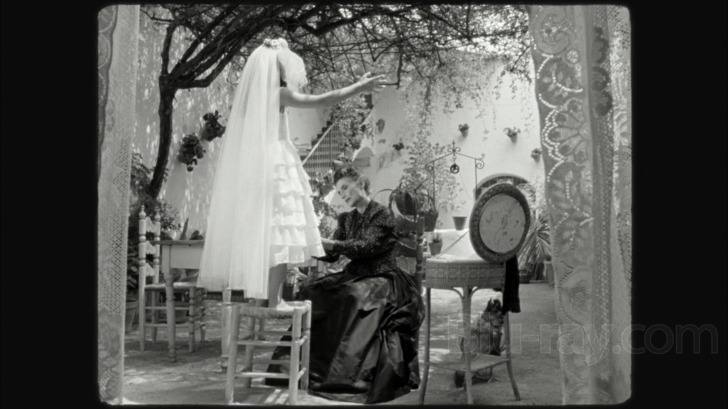
- Trailer (1080p; 1:45)
- Making Of Featurette (480i; 30:11) features some really interesting reminiscences from Pablo Berger, who talks about what inspired him to make Blancanieves. There are quite a few interviews with other crew members and a good look at setting up the bullfighting sequences.
- Director's Presentation (1080p; 1:48) repeats just a bit of the footage from the Making Of featurette but then moves on to a brief but rather philosophical set of comments from Berger where he talks about what the medium of film can make an audience experience.
- Preparing the Shoot (1080p; 5:24) is a kind of abbreviated Director's Diary.
- Blancanieves In Concert (1080p; 4:35) documents a performance of the film's score.
Blancanieves Blu-ray Movie, Overall Score and Recommendation 
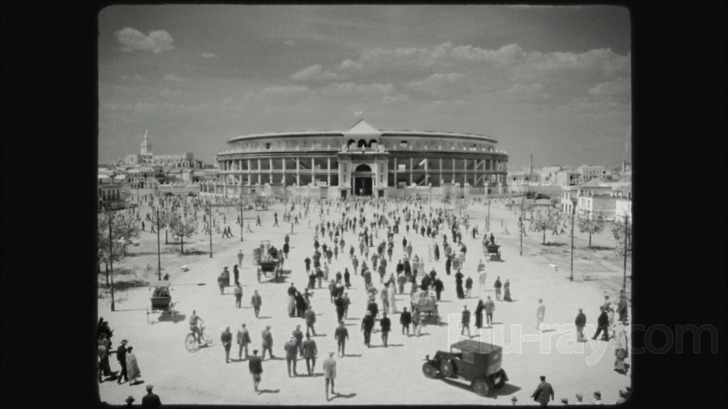
Blancanieves is a haunting, lyrical achievement that, for me anyway, was far more resonant than The Artist. Berger is a master of the moving image, and along with supremely brilliant editing from Fernando Franco has created one of the most indelibly memorable films of the past several years. Hollywood can throw its untold millions at projects like Snow White and the Huntsman, but they will still fail to create the ineluctable magic that Berger has with this gorgeous and deeply affecting piece of art. Highly recommended.
Similar titles
Similar titles you might also like

The Forbidden Room
2015

The Dance of Reality
La danza de la realidad
2013

The Tempest
Derek Jarman
1979

Hamlet
1948

Beauty and the Beast
La belle et la bête
1946

Cemetery of Splendor
2015

Sundays and Cybèle
Les dimanches de Ville d'Avray
1962

Chained for Life
2018

Biutiful
2010

My Life as a Zucchini
Ma vie de Courgette
2016

Evolution
2015

Her Smell
2018

Endless Poetry
Poesía sin fin
2016

Belladonna of Sadness 4K
1973

The Thief of Bagdad
1924

Sorry We Missed You
2019

The Dead
1987

The Gold Rush
1925 and 1942 Versions
1925

Bonjour Tristesse
Limited Edition to 3000 - SOLD OUT
1958

Pather Panchali 4K
পথের পাঁচালী / Song of the Little Road
1955
